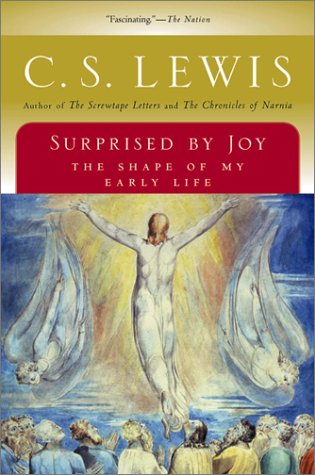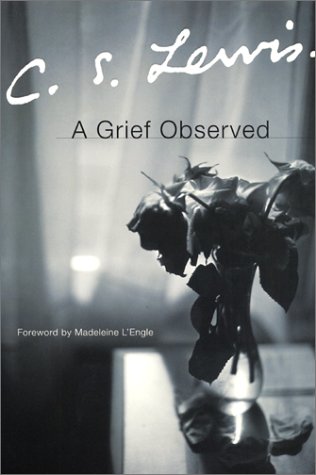Curious, I looked up The Marriage to see what it was about. I was interested to learn that The Marriage was itself written in response to an earlier book, Heaven and Hell by Emanuel Swedenborg (1758).
In each work, the author writes as though he has visited the afterlife and is writing to inform the rest of humanity about what he has seen. I briefly skimmed each to prepare to re-read The Great Divorce. To give a very, very brief summary:
Swedenborg believes that there are "heathens" in Heaven, and that God does not thrust anyone down to Hell but that people cast themselves down. {This seems to go along with Lewis' work.}
Blake calls Swedenborg's writings a "recaptiulation of all superficial opinions" and claims to have conversed with both angels and devils in a depolarized, unified afterlife.
Lewis refutes Blake's assertion that good and evil can eventually be reconciled. {This jives with Latter-day Saint belief, which states that "No unclean thing can dwell with God."}
This quotation by the George MacDonald {a poet greatly admired by C.S. Lewis} is on the title page of The Great Divorce:
'No, there is no escape.
There is no heaven with a little of hell in it--
no plan to retain this or that of the devil in our hearts or our
pockets. Out Satan must go, every hair and feather.'
It is on this belief that Lewis bases his work.
...
I love Lewis' style of writing. The way he describes the Tousle-Headed Poet is just so perfectly ironic:
"To make matters worse he had been exactly the sort of boy in whose case the examination system works out with the maximum unfairness and absurdity" etc.
He always writes from "our" perspective - we imperfect humans - with the sort of reason we would use to defend ourselves. But in seeing it down on paper, we realize how ridiculous is actually is.The scene where one of the Ghosts meets a "bloody murderer" in heaven reminds me of the poem that goes:
"When you get to Heaven, you will doubtless view
Many whose presence there will be a shock to you.
Do not look around; do not even stare.
Doubtless there'll be many surprised to see you there!"
"I got to have my rights same as you, see?"
"I haven't got my rights, or I should not be here. You will not get yours either. You'll get something far better. Never fear."
"I only want my rights. I'm not asking for anybody's bleeding charity."
"Then do. At once. Ask for the Bleeding Charity."
This conversation gets me every time. None of us gets what we deserve - thank Goodness. & I love that description of Christ - the Bleeding Charity.
"You weren't a decent man and you didn't do your best. We none of us were and none of us did. Lord bless you, it doesn't matter."
I really like the description given of Heaven: we will be "free, as a man is free to drink while he is drinking. He is not free still to be dry."
I wonder at the significance of the sentence at the very end of chapter 5: "This did not prevent me from walking up-stream: it only meant that by walking very fast indeed I made very little progress." This isn't part of any conversation between Ghost and Spirit; merely a part of the narrative. Yet I wonder at it's meaning.
The next chapter continues the narrative of Lewis walking upstream, detailing how the journey gradually becomes more difficult, until he is forced to leave the river and continue walking on the banks
The Ghost in chapter 7 seems to have share Blake's opinion - that Heaven and Hell are "run by the same people." This philosophy, of course, is what Lewis is refuting in his work.
I love this quote by the Spirit George MacDonald: "Both good and evil, when they are full grown, become retrospective. That is what mortals misunderstand. They say of some temporal suffering, "No future bliss can make up for it," not knowing that Heaven, once attained, will work backwards and turn even that agony into a glory.""
"To be afraid of oneself is the last horror."
"Those that hate goodness are sometimes nearer than those who know nothing at all about it and think they have it already."
"Those that hate goodness are sometimes nearer than those who know nothing at all about it and think they have it already."
I love the story at the end of chapter 11. I can't even write it down in a way that would do it justice. You just need to read it. It gets to me. I love it. The song that the earth sings at the end,
"Share my rest and splendour till all natures that were your enemies become slaves to dance before you and back for you to ride, and firmness for your feet to rest on... the strengths that once opposed your will shall be obedient fire in your blood... Overcome us that, so overcome, we may be ourselves" reminds me of Ether 12:27 - Then will I make weak things become strong.
Chapters 12&13 remind me of Lewis' other work, The Four Loves. Especially the part where the Lady says, "I am full now, not empty. I am in Love himself, not lonely. Strong, not weak. You shall be the same. Come and see. We shall have no need for one another now: we can being to love truly."
"Here is joy that cannot be shaken. Our light can swallow up your darkness: but your darkness cannot now infect our light. No, no, no. Come to us. We will not go to you. Can you really have thought that love and joy would always be at the mercy of frowns and sighs? Did you not know they were stronger than their enemies?"
"I am in Love, and out of it I will not go."
"[Hell] seems big enough when you're in it, Sir."
"And yet all loneliness, angers, hatreds, envies and itchings that it contains, if rolled into one single experience and put into the scale against the least moment of the joy that is felt by the least in Heaven, would have no weight that should be registered at all. Bad cannot succeed even in being bad as truly as good is good."
Lewis references Swedenborg at the end - I'm glad I did my research ;)
SUCH AN AMAZING BOOK.
Lewis references Swedenborg at the end - I'm glad I did my research ;)
SUCH AN AMAZING BOOK.














No comments:
Post a Comment